St. Ambrose University Ends Theater Major, Despite Massive Opposition
Despite an online petition protesting theater cuts, the private St. Ambrose University in Davenport has decided to eliminate its award-winning theater major, but maintain faculty and programs. It’s also cut two theater staff positions.
“It’s a disappointing decision, and a short-sighted one,” River Music Experience executive director Tyson Danner (a 2007 SAU alum) said Monday by e-mail. “I don’t believe the university’s leadership has an understanding of the value of the arts, or the important role SAU has (had?) as an anchor of our arts and culture community.”

SAU staged the musical “Cabaret” in spring 2018.
Steph DeLacy, an area choreographer and 2009 Ambrose theater grad, said Monday she was devastated when she heard the school was even considering cutting the major.
“As an alum and an active member of the theatre community in the Quad-Cities, I cannot say enough good things about what the St. Ambrose theatre department has done for me and the Quad-Cities area,” she said. “My education at SAU and specifically with the theatre department was second to none.
“The opportunities that were available to me and experiences I had were numerous and educational, but also personal,” DeLacy said. “I connected strongly with the department as a whole and felt cared about on a personal level. As I have pursued a career as a full-time theatre choreographer in the QC, my relationships with Dr. Corinne Johnson, Kristopher Eitrheim, and Daniel Rairdin-Hale have continued, as they have mentored me over the years.

Tyson Danner is executive director of River Music Experience.
“I would not be who I am without their love and support, and I’m so deeply saddened that the future SAU will not have the opportunity to learn from these wildly talented and kind people,” she said. “I’m incredibly disappointed that the SAU experience I had is no more.”
Paul Koch, the SAU Provost and Vice President for Academics and Student Affairs, said that following a review process and recommendation, the university decided to close the theater major, and no incoming students starting fall 2021 can declare that as a major.
“Provisions will be made for all current students majoring in Theatre to complete their major at St. Ambrose University, and current tenured faculty in the Department are being retained,” he said Monday by e-mail. “St. Ambrose is committed to sustaining Theatre programming as many students beyond majors have historically participated in productions, both on stage and behind the scenes.
“In addition, we are committed to providing for coursework in Theatre at some level, and faculty members are currently working to develop a plan that will allow this to occur into the future,” Koch said. “We will announce the details of our plan as soon as it becomes available.”
“Changes such as closing the theatre major only are made following a thorough review process that intentionally includes faculty input,” SAU

The closing gas-chamber scene of SAU’s “Cabaret,” directed by Cory Johnson.
spokesman Craig DeVrieze said. “In every instance, students currently majoring in a program are able to fully complete their program studies.”
“Academic program review of both curriculum, enrollment, and finances is a process our faculty are committed to doing regularly,” he said.

Danner at Quad City Arts in 2015.
“In addition to starting new mission-driven programs where there is demand, we do occasionally change or close major programs if a rigorous review process determines resources can be better allocated elsewhere.”
Theater department faculty were not made available to discuss the status of the program.
The theater department page at sau.edu has been updated to say: “Please note that First-Year and Transfer students enrolling at SAU in Fall 2021 may not select Theatre as a major.”
Then it goes on to say: “Fast track your success by pairing your love of the theatre with a robust theatre degree from SAU. No matter if your dream lies behind the scenes or at center stage, our theatre program is vibrant, active, and will help you prepare for the career of your dreams.”
In 2020, the university had 17 theater majors (out of an enrollment of 2,300 undergrad students), and 26 theater majors last year, according to department chair Daniel Rairdin-Hale. There are three tenured theater
faculty, among 335 total SAU faculty (in 2018).
“It’s a shame that a liberal arts institution would cut a celebrated, award-winning, and regionally recognized theatre program,” Daniel Sheridan (class of 2005), Supervisor of the Davenport Junior Theatre program, said Monday. After Ambrose, he earned his master’s in acting at University of Connecticut.
“The SAU theatre program not only creates great theatre artists, but people who are able to collaborate, innovate and think outside the box as we move further into the 21st century,” Sheridan said. “Something dear has been lost from the fabric of SAU.”
“So many of us wrote letters, had community partners write letters, and spoke up about this decision,” he said. “While SAU continues to support and expand sports teams, it should have been a somewhat easy decision at a liberal arts institution to keep the theatre major.”
“The community should care because the SAU theatre program has created so many leaders in the QCA, both in the arts and elsewhere,” Sheridan said. “This decision is something that will be felt slowly by the community over time as these creative, dynamic and innovative future leaders find a different university and different community for which they will become a part.”
Online petition draws 2,800-plus signatures
A petition protesting Ambrose theater cuts at Change.org has received over 2,800 signatures as of Monday.
“Removing the theatre major will rob many students of opportunities to take classes that will help them to develop and hone essential skills within and outside of the theatre world,” says the page, started Aug. 28 by SAU senior Erika Seabloom.
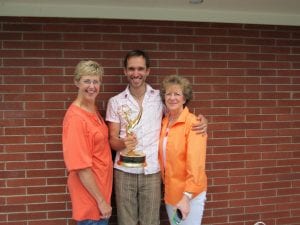
Brian Hemesath, a ’93 alum, shows off an Emmy award to Cory Johnson, left, and Dianne Dye.
Ambrose has produced many successful theater alumni, including Emmy-award winning Brian Hemesath, who has designed costumes for shows on and off-Broadway, as well as TV’s “Saturday Night Live” and “Sesame Street.” In late July, the 48-year-old Iowa native won his third Daytime Emmy Award for his work on “Sesame Street.” Hemesath — who earned his bachelor’s in theater and art in 1994 from SAU — has a total of eight Emmy nominations.
“Without the theatre major, Brian would not have attended St. Ambrose,” the online petition says. “Even if he had attended as a theatre minor, based off the current requirements, he would not have been required to take Introduction to Design. It may not have even been offered.”
Getting rid of the major is not only a detriment to those interested in majoring in theater, Seabloom wrote. SAU is “a liberal arts college that prides itself on providing a well-rounded education to its students. Because of this, St. Ambrose requires all students to take at least one Creative Arts course,” the petition says.
“It does not necessarily have to be in theatre, but many students choose to take their required class in theatre. Removing the major and reducing the number of classes offered therefore impacts any student interested in taking a theatre course, regardless of major. Research has shown that there are many benefits to studying, observing, and participating in theatre.”
“Being involved in theatre has been proven to improve academic performance in other subjects, such as math and science,” the petition says.

Daniel Sheridan is the supervisor for Davenport Junior Theatre.
“It teaches valuable teamwork and communication skills not found in other classes. Theatre opens student’s eyes to experiences other than their own, helping them to be more empathetic and understanding of others. This is something that is essential to the success of all individuals, no matter what their career path might be. It is what helps us grow as a society.”
In September, artist Leslie Bell (a longtime SAU art professor) wrote on the site:
“I photographed every play on Galvin stage for years and years and learned so much from the amazing actors, directors and professors—an experience I’ll never forget. I can’t believe that any liberal arts college or university would have the nerve to axe a program that informs the totality of the campus and Quad-City communities with such a diverse and powerful set of messages of inclusion, human suffering, love, striving, philosophical achievement and artistic quality.
“I’d also like to remind the decision makers that no other major brings so many members of our diverse community to the Ambrose campus to have a profound, communal experience,” Bell wrote. “Theater is life and life is theater.”
Danner – who formerly headed the QC Theatre Workshop and was community arts director at Quad City Arts – transferred to SAU from Iowa State after freshman year in large part because of the idea of liberal arts education.
He was a music major, and involved in several productions.
“Since I graduated, I’ve watched the university continue to invest millions in new athletic programs and buildings,” Danner said. “For some
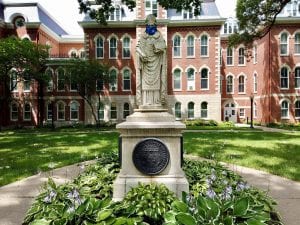
St. Ambrose is at 518 W. Locust St., Davenport.
reason, whenever the arts are on the chopping block, there is a sudden concern about finances. Yet at the same time they eliminated the theatre major, they are adding two brand new athletic programs.”
“In contrast, look at what Augustana has done the past several years. That school values the arts and has invested accordingly,” he noted. “They have a fantastic new theatre space and a rapidly-growing theatre program. That is not the path St. Ambrose has chosen to take, unfortunately.
“Ultimately, it’s not even the future theatre students that will be harmed by this decision,” Danner said. “Prospective students interested in theatre careers will just choose another college, like Augustana. The ones who will really lose out are the rest of the students. Their college experience won’t be improved by the creativity and perspective of a full theatre department.”
The Brunner Theatre Center at Augustana (3750 7th Ave., Rock Island) opened in fall 2016. The $4.2-million project, which transformed the upper two floors of the College Center, was named for alums Kim Brunner (’71) and Donna Huber (’75), who provided the lead and naming gift of $1 million.
In late 2017, Augie added Shelley Cooper as assistant professor of theater arts, heading the private college’s new musical-theater concentration. That same year, Augustana also debuted the professional summer-stock company, Mississippi Bend Players, based at Brunner.
Veteran and newcomer staff cut
SAU staff members of the theater department, Dianne Dye and Zack Lawson ’18, were let go this fall due to budget cuts, according to sau.edu.
Due to the Covid-19 pandemic, the fall mainstage musical, “First Date,” was cancelled and replaced with the radio play, “An Enemy of the People.”
Dye got her start with the Theatre Department in 1998 when her neighbor, Susan McDonald, suggested to Corinne Johnson that she should volunteer in the costume shop. At that time, Johnson would design and stitch the costumes while also directing the mainstage shows, and
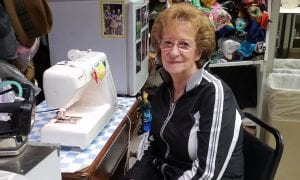
Costume designer Dianne Dye was let go this fall after 22 years working for Ambrose.
she needed help. As Dye had recently retired and had done a lot of sewing and costuming for Davenport North High School, she decided to accept the offer.
The first show Dye helped with was “Tartuffe,” alongside guest designer and Emmy Award winner, Brian Hemesath, ’93. Eventually, Johnson asked her to organize the costume shop, which turned into her designing for the department.
“My path went from volunteer, to part-time employee, to full-time employee, to feeling like the SAU Theatre Department was my family,” Dye said.
The project Dye was most proud of was the musical comedy, “The Drowsy Chaperone,” produced by SAU in 2010. During this production, she successfully designed three separate wedding dresses that could be quick-changed in the middle of a song.
Another fond memory is when Dye went along for the ride when SAU’s production of “Anton in Showbusiness” went to the Kennedy Center American College Theatre Festival in 2002. It was her first time attending and she loved seeing the students perform.
Dye told SAU that she’ll always remember “the incredible fundraiser that the Department hosted for me after my husband had passed away. Alumni came from far and wide to perform. It was very heart-warming,” she said.
Lawson started his journey with the department as a student when he transferred to SAU in spring 2016. He became the assistant stage manager for “Hedda Gabler,” and then “Noises Off.” Additionally, Lawson worked in the scene shop, helped with light hangs, and immersed himself in as many theater classes and projects he could during the two short years he was a student.
SAU’s production of “Cabaret” in 2018 was his last show as a student, as well as one of his favorite productions at SAU.
“I remember at the end of the show, the audience had no idea how to react,” Lawson said. “It was such a great moment leaving an audience in stunned silence.”
Past success at SAU theater
St. Ambrose has fared extraordinarily well in its experience with the Kennedy Center American College Theater Festival.
SAU has garnered several KCACTF Certificate of Merit awards for directing, scenic design, lighting design, costume design, stage management and ensemble acting. Many SAU students have been selected to compete in the Irene Ryan Acting competition – at least 15

Corrine Johnson is a theater professor at St. Ambrose.
students have advanced to the Ryan semi-final round, and nine have advanced to the final round.
In 2003, SAU’s Dan Rairdin-Hale (now the department chair) and in 2005 Daniel Sheridan won the regional acting competition and went on to be one of 16 undergraduates and graduates nationwide to compete at the Kennedy Center in Washington, D.C.
In 2005, theater professor Cory Johnson was named Acting Coach of the Year for KCACTF Region V. She also acted as regional coordinator of the Irene Ryan Acting Auditions from 2010 to 2013.
Johnson in 2017 received a pinnacle honor of her profession, The Kennedy Center Medallion from the college festival. Each year, the eight KCACTF regions honor individuals or organizations that have made extraordinary contributions to teaching and producing theater, and who have “significantly dedicated their time, artistry and enthusiasm to the development” of the festival, according to the prize summary.
“Most importantly, recipients have demonstrated a strong commitment to the values and goals of KCACTF and to excellence in educational theater,” it says, noting the gold medallion is the most prestigious regional award given by KCACTF and is considered one of the great honors in theater education.
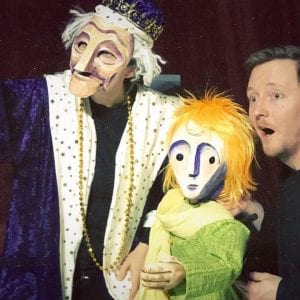
Dan Rairdin-Hale, theater department chair, in his production of “The Little Prince.”
In 2009, SAU theatre major Rachel Mayer won the regional student directing title and was invited to spend a week at the Kennedy Center studying directing with renowned professionals. In 2010, alumna Sarah Ulloa won the first prize in Musical Theatre Performance and senior Dan Hernandez won the title of Best Scene Partner.
In 2018, senior Hannah Donovan won first place in the stage-management competition at Region V, and spent a week that April at the Kennedy Center.
Earlier this year, three members of SAU’s “The Little Prince” production were honored with national festival awards. Joseph Lasher and Jeremy Mahr won Distinguished Performance by an Actor, and Aaron Hook was recognized with Distinguished Lighting Design.
They were among more than 120 students selected to travel to Washington, D.C. for an all-expenses paid trip to participate in National Festival events at the Kennedy Center, April 6–10, but the 2020 festival was unfortunately canceled due to the Covid-19 pandemic.
Danner letter in protest
Tyson Danner wrote a letter to Ambrose in protest of the theater cuts, noting that the department and breadth of education helped make him “a better person, a better leader, and a better contributor to my community.”
“In my theatre classes, I gained confidence, crafted my public speaking skills, gained new perspectives into others, and learned how to communicate clearly, effectively, and with emotion,” he wrote. “Thanks to the stellar theatre faculty, I gained mentors who taught, guided, advised, and helped me build a professional network that continues to enrich my life to this day.”
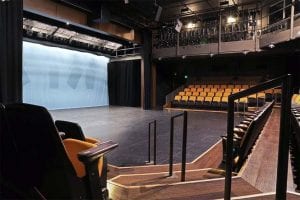
The $4.2-million Brunner Theatre Center opened in 2016 at Augustana College.
“The skills I gained from my Theatre classes, in particular, have prepared me for a successful career in which I believe I am making a difference in our community,” Danner wrote. “With a group composed primarily of SAU Theatre alumni, I took part in founding a small professional non-profit theatre, the QC Theatre Workshop, which has provided professional opportunities to many local actors (including current SAU students and alumni).
“I have contributed my skills and experience to Davenport Junior Theatre, Quad City Arts, and now as the Executive Director of the River Music Experience, a pillar of the Quad-Cities’ arts and culture scene,” he said.
“I have no doubt that without my experiences at St. Ambrose – and especially the skills I gained through involvement with the Theatre program and its fine faculty – I would not have the career I have today,” Danner wrote.
“As you make your decisions, please remember the role that the St. Ambrose University Theatre Department plays in our community. This department and its faculty are leaders in the cultural scene of the Quad-Cities. To eliminate the major and weaken the department will have adverse effects on our greater community, and will reduce SAU’s standing in our region.”
“At one time, this university prided itself on not just technical instruction, but true liberal arts education,” he wrote, “I appreciate the challenging decisions you have to make. I hope that, as you think about the priorities of St. Ambrose and the philosophy the school once held at its heart, you will remember that the Theatre department plays an important role.”
DeLacy in the school spotlight
As it prepared to make its theater major cut, Ambrose theater alum Steph DeLacy was featured in an SAU online spotlight this month. It wrote that she’s “proven that with hard work and dedication, making your own way can be accomplished anywhere, especially in the booming theatre scene that is the Quad-Cities.”

Steph DeLacy has choreographed over 30 musicals in the Q-C area.
“I ended up going through five majors before making my way to theatre,” the 33-year-old choreographer said in the Oct. 8 spotlight. “It was the only thing that felt ‘right’ and ‘like home.’ I also really connected with Cory, Kris, and Mike (Kennedy) and knew that the Theatre program was where I belonged.”
Throughout her tenure at SAU, DeLacy found joy performing in productions such as “Stop Kiss,” “Rabbit Hole,” and “Sweeney Todd.” It was the children’s show “Seussical” her senior year, which was her first time stage managing.
“I absolutely LOVED it, and learned so much through the process,” DeLacy told SAU. “Kris essentially took me under his wing, because I had no idea what I was doing, and it was one of the best experiences I’ve had to date.”
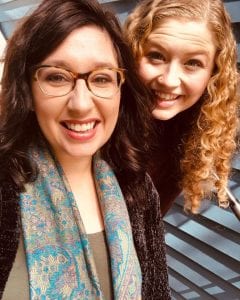
DeLacy with Megan Warren.
Now, post-graduation, she’s taken the skills she learned and works as a choreographer (and occasional director) who specializes in musical theater and show choir. DeLacy works with eight area high schools and two community theaters, choreographing numerous shows each year.
She recently started offering private tap lessons both in person and online. (Readers can check out her website for more info.)
When not choreographing for lessons or a production, you can find DeLacy working on her newest project, “Double Threat: The Podcast.”
She and her close friend Megan Warren (a vocal coach and Spotlight Theatre music director) were brainstorming ideas for a musical theater podcast before Covid hit. In April, they started “Double Threat: The Podcast.”
“Each episode, we select a theme and choose a musical to represent said theme,” DeLacy said. “We talk about the shows themselves, the process from workshopping to Broadway, the actors, show gossip, and
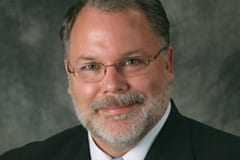
Paul Koch is SAU provost.
even delve into audition and production tips, from our experiences. Initially, it was just something we started to fill the time. However, we’ve now released 23 episodes via SoundCloud, Spotify, and Apple Music and have listeners across the country, and a few overseas.
“It’s been such a fun way to connect with people in a time when live theater isn’t an accessible option,” she said.
On Monday, DeLacy said the Ambrose theater major move “makes it seem like the university does not care about the art program or the extensive alumni network connected to the department. I had always hoped to choreograph a mainstage musical for SAU and while I’m very sad I may never get that chance, I am even more upset for the amazing faculty and the current as well as future students.”
“This is a devastating blow to the arts in the Quad-Cities,” Sara Tubbs, a local actress and co-owner of Moline’s Spotlight Theatre, posted on Facebook. “I have had the honor of working with many incredible students that have graduated from the St. Ambrose theater programs and with their immensely talented staff. Why is it that arts are always the first to be cut?”









